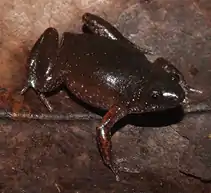Chiasmocleis crucis
Chiasmocleis crucis is a species of frog in the family Microhylidae.[3] It is endemic to Bahia in eastern Brazil. It is known from Camamu, its type locality, and from the Serra Bonita Private Reserve of Natural Heritage in Camacan/Pau Brasil.[3][4][5] The specific name crucis honors Carlos Alberto Gonçalves da Cruz, a Brazilian herpetologist.[2]
| Chiasmocleis crucis | |
|---|---|
 | |
| Specimen from the Serra Bonita Private Reserve of Natural Heritage | |
| Scientific classification | |
| Kingdom: | Animalia |
| Phylum: | Chordata |
| Class: | Amphibia |
| Order: | Anura |
| Family: | Microhylidae |
| Genus: | Chiasmocleis |
| Species: | C. crucis |
| Binomial name | |
| Chiasmocleis crucis Caramaschi and Pimenta, 2003[2] | |
Description
Six adult males in the type series measure 19–20 mm (0.7–0.8 in) in snout–vent length. The body is ovoid in shape. The snout is short. No tympanum is present. The fingers lack webbing. The hind limbs are robust and the toes have some webbing. Preserved specimens are uniformly dark brown. Some specimens may have a thin vertebral line, but it is incomplete in others. The lower parts are cream-colored with darker marbling. Males have a small subgular vocal sac.[2]
The male advertisement call consists of multi-pulsed notes produced in series lasting 6–14 seconds. Each call has 33–77 notes with dominant frequency of 4069–4435 Hz.[4]
Habitat and conservation
The type series was collected in a temporary pool at 120 m (390 ft) above sea level. The pool was located within tropical forest consisting of a mix of early secondary growth and good cover forest.[1] The Serra Bonita population was found during breeding in a temporary pond inside a fragment of Atlantic Forest and in a larger pond on the banks of a dirt road across an agroforestry system consisting of cocoa and native shade trees.[4]
As of 2004, threats to this species were unknown.[1] One population is found in the Serra Bonita Private Reserve of Natural Heritage.[4][5]
References
- Caramaschi, U. & Pimenta, B. (2004). "Chiasmocleis crucis". IUCN Red List of Threatened Species. 2004: e.T57756A11681069. doi:10.2305/IUCN.UK.2004.RLTS.T57756A11681069.en. Retrieved 20 December 2017.
- Caramaschi, U. & Pimenta, B. V. S. (2014). "Duas novas espécies de Chiasmocleis Méhelÿ, 1904, da Mata Atlântica do Sul da Bahia, Brasil (Amphibia, Anura, Microhylidae)" [Two new species of Chiasmocleis Méhelÿ, 1904 from the Atlantic Rain Forest of southern Bahia, Brasil (Amphibia, Anura, Microhylidae)]. Arquivos do Museu Nacional, Rio de Janeiro. 61: 195–202.
- Frost, Darrel R. (2018). "Chiasmocleis crucis Caramaschi and Pimenta, 2003". Amphibian Species of the World: an Online Reference. Version 6.0. American Museum of Natural History. Retrieved 26 August 2018.
- Forlani, Mauricio C.; Mendes, Caio Vinicius de Mira; Dias, Iuri Ribeiro; Ruas, Danilo Silva; Tonini, João Filipe Riva & de Sá, Rafael O. (2013). "The advertisement calls and distribution of two sympatric species of Chiasmocleis (Méhely 1904) (Anura, Microhylidae, Gastrophryninae) from the Atlantic Forest". South American Journal of Herpetology. 8 (1): 46–51. doi:10.2994/sajh-d-12-00027.1.
- Dias, I. R.; Medeiros, T. T.; Nova, M. F. V. & Solé, M. (2014). "Amphibians of Serra Bonita, southern Bahia: a new hotpoint within Brazil's Atlantic Forest hotspot". ZooKeys (449): 105–130. doi:10.3897/zookeys.449.7494. PMC 4233400. PMID 25408616.
